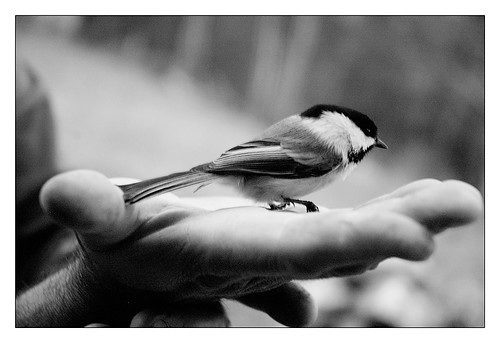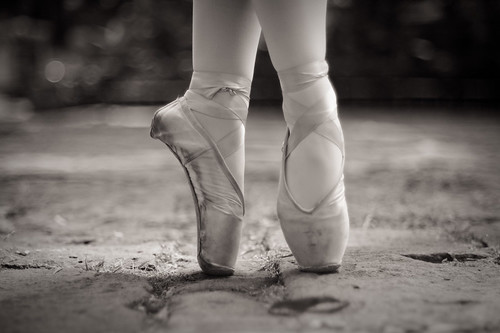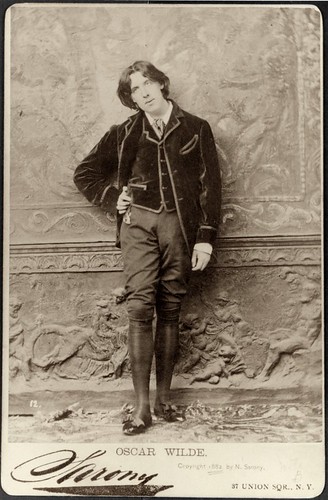Monday, July 29, 2013
Thoughts on Bird By Bird by Anne Lamott
Friday, April 5, 2013
Rhapsody
Wednesday, March 27, 2013
Lissom
Monday, March 25, 2013
Insentient
Adventures in Logophilia, Day 191:
unfeeling, unconscious; incapable of understanding human things or showing sympathy; in other words, inanimate.
Does this man look insentient to you?
Thursday, March 21, 2013
Wisdom from Oscar Wilde
"The best work in literature is always done by those who do not depend on it for their daily bread, and the highest form of literature, Poetry, brings no wealth to the singer... Make some sacrifice for your art and you will be repaid but ask of art to sacrifice itself for you and a bitter disappointment may come to you."
To me this sounds like: "so you're a novelist who earns her living as a receptionist? Excellent! You're able to let your art remain art! I know you dream of one day earning your living by your novels, but it might not be as rosy as you think. Until then, use this time to grow as a writer and a student of language and see where it takes you. You might go farther than you think." Thank you, Mr. Wilde.
***
In a similar vein, author Matt Haig also had thirty pieces of encouraging wisdom to share via the Telegraph. My favorites were:
- Being published doesn't make you happy. It just swaps your old neuroses for new ones.
- Success depends on great words and passionate people. The words are up to you. The people you have to pray for, and stand by them once you have them.
- Beauty breeds beauty, truth triggers truth. The cure for writer's block is therefore to read.
Friday, February 22, 2013
Patina
A film (usually green) that forms naturally on copper and bronze due to long-term exposure (or artificial acid treatments), valued for its color. I love this word - it is the surface mark of something that has grown beautiful with age and use. It also describes ones appearance or aura derived from association, habit or established character. More generally: a superficial exterior.
Saturday, December 29, 2012
Myth: Ideal Writing Conditions (j)
| Cassandra Mortmain writing in the 2003 film version of I Capture the Castle. |
 |
| Anne Frank hard at work in 1941, before the Annex. |
I write this sitting in the kitchen sink. That is, my feet are in it; the rest of me is on the draining-board, which I have padded with our dog's blanket and a tea cozy... I found that sitting in a place where you have never sat before can be inspiring. I wrote my very best poem sitting on the henhouse.
 |
| Cassandra writes in bed, while sister Rose talks. |
Places Cassandra writes:
- kitchen sink
- kitchen table
- attic
- in bed
- tower
- father's desk in the gatehouse
- the mound
Lastly: Stephen King, whose memoir on writing has been a tremendous help to me, writes about his dream desk:
Put your desk in the corner, and every time you sit down there to write, remind yourself why it isn't in the middle of the room. Life isn't a support system for art. It's the other way around.
Writers thrive under less than ideal circumstance: in the rickety chair, at the tilting kitchen table, in the barn, in a room filled with noisy people, with a cat constantly jumping up in one's lap and walking across the desk. These conditions flavor us and build up our carapace. The world is our office. Waiting for ideal conditions is simply an excuse not to write, even though - as proved by the sheer fact of our creative drive - we have the tools to make these conditions useful. Granted, we're a stubborn bunch, but how awesome is it to say, "Yes, I shall write today even if this coffee shop is noisy and the coffee bitter, even if the cat jumps all over me and the dog whines on the other side of my door, even if that awesome television show is calling to me like a Siren."
I've been pondering the phraseology of "full-time writer." What is a full-time writer, anyway? Well, you say (wondering if I've asked a trick question), it's someone who is fortunate to be able to write for a living by freelancing, writing stories, publishing novels. Yes, a typical day in the life of a full-timer looks like heaven to us office-job-or-otherwise people. But I don't "qualify" to have the "full-time" sticker next to my name simply because it isn't how I earn my bread? Silly.
If you're fortunate enough to have a job where you can write in spurts as you work, take advantage of it... albeit discreetly. Get up early in the morning because your story means something to you. Netflix and Redbox are not adverse conditions; they're choices. Having trouble connecting to your story? Try writing it by hand. Don't like your handwriting? There are ways you can improve it. How much are you feeding your artist-child? Read! Take creative outings! Go on quiet walks! And give yourself more credit for weathering the storm!
Someday we might have that dream office or the quiet house, but until then, embrace the place in which you're writing now. It's helping you more than you might think.
Happy writing!
Monday, December 24, 2012
Auteur (j)
Auteur
An auteur is the term for a film director who practice accords with the auteur theory, influencing a film so much to count as its (sole) author. More broadly, this refers to an artist (especially a musician or a writer) whose style and practice make his/her work distinctive.
Thursday, December 6, 2012
Neil Gaiman on Art
Friday, April 6, 2012
To-Do Lists from a Master (Jillian)
First of all... I was mildly surprised that an artist so, well, historically immortal would ever need to write out to-do lists. Or take notes. Or remind himself to pick up a set of chalk along with shirts and stockings before going off on a journey to Pavia to, um, dissect some cadavers at the medical school there.
Second, his lists and notes put mine to shame. This man truly had to have been a genius. Even these scribblings and anatomical drawings are beautiful, whereas mine have wound up in the recycling with absolutely no regrets.
Third, I am fascinated that someone found these lists and kept them. They're important little glimpses into an artist's process, and allows us to wonder at him several hundred years later. It is not necessarily that he was a genius or that his masterpieces appeared on canvas fully formed (uh, no) - but that he possessed the same drive to know and to explain and to imagine the universe that we do today... sketching and dissecting and creating as he did.
Friday, February 18, 2011
Computer Diaspora (Jillian)
Forgive the moaning in the above paragraph, but I am sure you can relate. When a writer’s preferred tool of crafting and performing her art is mercilessly taken away, a feeling of hopelessness settles in. Last year, I had the misfortune of falling down marble stairs at work with the same computer. Result? Cracked screen, just like a car windshield, but in retrospect, it could have easily been my skull. It was taken a repair shop where it languished idle for about two and a half weeks. Never mind how expensive that venture was, it was next to impossible to overcome the feeling that my hands had suddenly been cut off, and I could not write. Period. I dread returning to that state of writing paralysis again.
As I consider sending my dear friend away for another necessary respite, I cannot help but think how ludicrous the “writing paralysis” is. Yes, it is almost excruciating to be separated from the thing that has been such a vital instrument in my writing, but… I can write… because essentially writing is not about the computer. My brain works the same. My hands still work. The story is in my head, and not necessarily in its most consummate form on the hard drive, anyway. And, I must remind myself, writing via word processing machine is only a recent trend. After all the likes of the magnificent Mr. Chaucer and Mr. Shakespeare, many before and many, many after, produced manuscripts without use of a laptop, spell-check, online references and dozens of fancy fonts. Quills, hand-made ink, grossly expensive parchment and/or vellum, blotting paper, and candlelight… those were the tools. And what wonderful tools they are!
In fact, only last year (if you recall), Agatha Christie’s writing desk went on sale, no doubt for a pretty sum. I read Lucy Davies’ blog on the Telegraph website, and was intrigued some time ago by an entry devoted to those who collect the palettes of van Gogh, Monet, Manet, Mattise, etc. Anne Frank’s diary is preserved under glass. So is the Magna Carta in its various surviving versions. I wonder sometimes if I ever become noteworthy (ha! If at all, long after my demise!) would they preserve my laptop behind glass? Would it convey the same meaning as Jane Austen’s simple writing table, or would it be just another old computer with a black, dead screen? Hm…
I must remind myself that I do have these simple tools, too. Wouldn’t it be such a challenge, such an adventure to continue work on my novel as if nothing ever happened… except the change in medium? If all those others can make use of simple paper and pen, why can’t I? I already do.
So, I am beginning to toy with the idea of writing actual chapters via legal pad. While I have not yet lost the ability to write with a pen and paper, I don’t know if I’d have the patience for it. Another idea… old typewriter? That would definitely be an easier transition. But where might I find one that is both functional and semi-affordable?
A lot of things to think about. My only hope is that any crazy experiment can cause me to grow into a more versatile writer… the kind of person who can write a novel on a train or in a coffee shop, even if all I have is a napkin. After all, that’s what J.K. Rowling did – legal pads, coffee and a café after hours.
By Jove! It’s so simple, it just might work!
Wednesday, March 24, 2010
Creeped Out - Hitler the Artist (Jillian)
Yes, this creeps me out, and I am certain I'm not overreacting. To put "a Hitler" alongside, say, "a Monet" is inconcievable to me.
Art is powerful, no matter what the medium. It speaks volumes. It touches the soul. It is almost ineffable, sacred. That is why writing and painting and photography and dance, etc, etc, are incredibly important - they are created out of the struggles, triumphs and musings of the human spirit. If those creations are from Hitler, I want to stay as far away from them as possible. Not that I am worried about subliminal messages... but that anything I'd see is tainted by the knowledge of the Holocaust. It isn't the sort of art that belongs on a wall, displayed in glory.
Thursday, February 26, 2009
Sandy: A Recantation (Jillian)

I spend a fair amount of time at UNL, despite the fact that I graduated in May. There is something about it that spells home to me, and its hidden nooks and woody areas provide a retreat from my not-so-quiet job. If you've ever been to UNL, you've probably walked through the "Sculpture Garden", the area of which is merely sprinkled with a collection of modern statuary. One of these is Richard McDermott Miller's "Sandy: in Defined Space", or as I often dismissed it: "Girl in a Box." When Michelle visited me last week, I have to say what came out of my mouth was an arbitrary "I hate it." And yet, in almost five years, I'd never really looked at her. And for a writer to have never looked deep on a piece of art… well… it's silly.


After my dismissive comment about hating "Sandy", I started thinking and really looking at her… and the silly fears I had about her began to fade. First of all - yes, she's nude, but why is she nude? Is it any worse than Michaelangelo's David? The nudity, I decided is only a small part of it. In this case, it is to measure an unhindered spirit, protected inside the little space and concealing nothing. Further, she isn't trapped. There is no look of terror or despair on her face - nor is she looking out at me or any passersby with a silent plea for help. In fact, she is glancing off into space, at the foot she has planted up on one of the panels. It is a deep, pensive look - neither smiling nor frowning. Inside herself. She lets one hand dangle free. She does not grasp for an invisible door because she is free. She has made a choice between this box and the box beside it. She has made this space "defined". She is not, I am confident to say, associated with the one submerged in the soil a few feet away.

It is amazing how much I am still learning… by seeing and thinking about the possibilities… imagining her to be a character with feelings and choices and a name instead of an object made of metal! Meanings inside meanings… the perpetual nesting doll! That is art!
 Sandy - with the Sheldon Art Museum to the south of her
Sandy - with the Sheldon Art Museum to the south of herSunday, February 22, 2009
Botanical Inspiration (Maren)


Welcome
To read more about why Daedalus Notes exists, click here.






